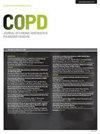Platelet-to-Lymphocyte Ratio (PLR), Neutrophil-to-Lymphocyte Ratio (NLR), Monocyte-to-Lymphocyte Ratio (MLR), and Eosinophil-to-Lymphocyte Ratio (ELR) as Biomarkers in Patients with Acute Exacerbation of Chronic Obstructive Pulmonary Disease (AECOPD)
IF 3.1
3区 医学
Q1 Medicine
International Journal of Chronic Obstructive Pulmonary Disease
Pub Date : 2024-02-23
DOI:10.2147/copd.s447519
引用次数: 0
Abstract
Purpose: The study comprehensively evaluated the prognostic roles of the platelet-to-lymphocyte ratio (PLR), neutrophil-to-lymphocyte ratio (NLR), monocyte-to-lymphocyte ratio (MLR), basophil-to-lymphocyte ratio (BLR), and eosinophil-to-lymphocyte ratio (ELR) in patients with acute exacerbation of chronic obstructive pulmonary disease (AECOPD).Patients and Methods: Six hundred and nineteen patients with AECOPD and 300 healthy volunteers were retrospectively included into the study. The clinical characteristics of the patients with AECOPD and the complete blood counts (CBCs) of the healthy volunteers were collected. The associations of PLR, NLR, MLR, BLR, and ELR with airflow limitation, hospital length of stay (LOS), C-reactive protein (CRP), and in-hospital mortality in patients with AECOPD were analyzed.
Results: Compared with the healthy volunteers, PLR, NLR, MLR, BLR, and ELR were all elevated in COPD patients under stable condition. PLR, NLR, MLR, and BLR were further elevated while ELR was lowered during exacerbation. In the patients with AECOPD, PLR, NLR, and MLR were positively correlated with hospital LOS as well as CRP. In contrast, ELR was negatively correlated with hospital LOS as well as CRP. Elevated PLR, NLR, and MLR were all associated with more severe airflow limitation in AECOPD. Elevated PLR, NLR, and MLR were all associated with increased in-hospital mortality while elevated ELR was associated with decreased in-hospital mortality. Binary logistic regression analysis showed that smoking history, FEV1% predicted, pneumonia, pulmonary heart disease (PHD), uric acid (UA), albumin, and MLR were significant independent predictors ofin-hospital mortality. These predictors along with ELR were used to construct a nomogram for predicting in-hospital mortality in AECOPD. The nomogram had a C-index of 0.850 (95% CI: 0.799– 0.901), and the calibration curve, decision curve analysis (DCA), and clinical impact curve (CIC) further demonstrated its good predictive value and clinical applicability.
Conclusion: In summary, PLR, NLR, MLR, and ELR served as useful biomarkers in patients with AECOPD.
Keywords: healthy volunteers, in-hospital mortality, length of stay, nomogram, pneumonia, pulmonary heart disease
作为慢性阻塞性肺疾病(AECOPD)急性加重期患者生物标志物的血小板-淋巴细胞比值(PLR)、中性粒细胞-淋巴细胞比值(NLR)、单核细胞-淋巴细胞比值(MLR)和嗜酸性粒细胞-淋巴细胞比值(ELR)
目的:该研究全面评估了血小板与淋巴细胞比值(PLR)、中性粒细胞与淋巴细胞比值(NLR)、单核细胞与淋巴细胞比值(MLR)、嗜碱性粒细胞与淋巴细胞比值(BLR)和嗜酸性粒细胞与淋巴细胞比值(ELR)在慢性阻塞性肺疾病急性加重期(AECOPD)患者中的预后作用:研究回顾性纳入了 619 名 AECOPD 患者和 300 名健康志愿者。研究收集了 AECOPD 患者的临床特征和健康志愿者的全血细胞计数(CBC)。分析了AECOPD患者的PLR、NLR、MLR、BLR和ELR与气流受限、住院时间(LOS)、C反应蛋白(CRP)和院内死亡率的关系:与健康志愿者相比,病情稳定的 COPD 患者的 PLR、NLR、MLR、BLR 和 ELR 均升高。在病情加重时,PLR、NLR、MLR 和 BLR 进一步升高,而 ELR 则降低。在 AECOPD 患者中,PLR、NLR 和 MLR 与住院时间以及 CRP 呈正相关。相反,ELR 与住院时间和 CRP 呈负相关。PLR、NLR和MLR的升高均与AECOPD患者气流受限的严重程度有关。PLR、NLR和MLR升高均与院内死亡率升高有关,而ELR升高则与院内死亡率降低有关。二元逻辑回归分析表明,吸烟史、预测 FEV1%、肺炎、肺心病(PHD)、尿酸(UA)、白蛋白和 MLR 是院内死亡率的重要独立预测因素。这些预测因子和 ELR 被用来构建一个预测 AECOPD 院内死亡率的提名图。该提名图的 C 指数为 0.850(95% CI:0.799- 0.901),校准曲线、决策曲线分析(DCA)和临床影响曲线(CIC)进一步证明了其良好的预测价值和临床适用性:总之,PLR、NLR、MLR 和 ELR 可作为 AECOPD 患者的有用生物标志物。 关键词:健康志愿者;院内死亡率;住院时间;提名图;肺炎;肺心病
本文章由计算机程序翻译,如有差异,请以英文原文为准。
求助全文
约1分钟内获得全文
求助全文
来源期刊

International Journal of Chronic Obstructive Pulmonary Disease
RESPIRATORY SYSTEM-
CiteScore
5.10
自引率
10.70%
发文量
372
审稿时长
16 weeks
期刊介绍:
An international, peer-reviewed journal of therapeutics and pharmacology focusing on concise rapid reporting of clinical studies and reviews in COPD. Special focus will be given to the pathophysiological processes underlying the disease, intervention programs, patient focused education, and self management protocols. This journal is directed at specialists and healthcare professionals
 求助内容:
求助内容: 应助结果提醒方式:
应助结果提醒方式:


